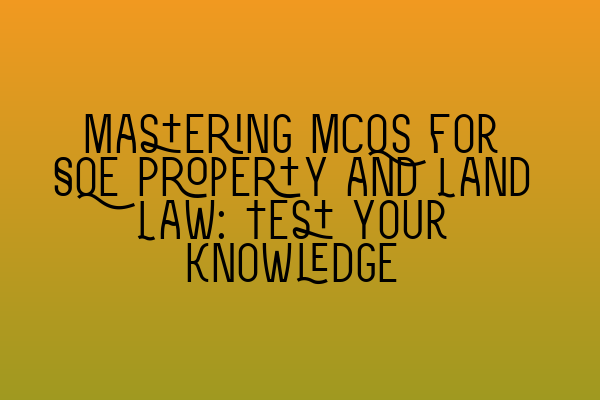Mastering MCQs for SQE Property and Land Law: Test your Knowledge
Are you preparing for the SQE Property Law and Land Law exams? Do you want to make sure you have a strong grasp of the key concepts and principles? In this blog post, we will guide you on how to master multiple-choice questions (MCQs) in SQE Property and Land Law and test your knowledge effectively. So, let’s dive in!
Before we begin, it’s important to understand the significance of MCQs in the SQE exams. MCQs are designed to assess your understanding of key topics and your ability to apply legal principles in a practical manner. They require you to analyze scenarios, identify relevant laws, and make accurate judgments – all under time constraints. So, it’s crucial to develop a systematic approach to tackle MCQs effectively.
1. Familiarize Yourself with the Syllabus
The first step in mastering MCQs for SQE Property and Land Law is to thoroughly understand the syllabus. Take the time to review the syllabus provided by the SQE exam board. By doing so, you can identify the key areas that are likely to be tested in the exam. Pay extra attention to topics such as land registration, easements, mortgages, leases, and co-ownership, as they often feature prominently in MCQs.
2. Review Key Concepts and Principles
Once you have familiarized yourself with the syllabus, it’s time to review the key concepts and principles of SQE Property and Land Law. Use textbooks, lecture notes, and online resources to refresh your knowledge on topics such as property rights, legal estates, equitable interests, and proprietary estoppel. Make sure you thoroughly understand the definitions, characteristics, and elements of each concept.
3. Practice with Past Exam Papers
Practice makes perfect, and the same holds true for MCQs in SQE Property and Land Law. Seek out past exam papers and practice answering the MCQs within the given time limit. This will not only help you gauge your current level of understanding but will also familiarize you with the format and style of questions that are likely to appear in the actual exam.
4. Analyze Your Mistakes
After completing practice exams, take the time to analyze your mistakes. Identify the areas where you struggled and revisit the relevant topics for a deeper understanding. Use your mistakes as learning opportunities to strengthen your knowledge and improve your exam performance.
5. Join Study Groups or Law Forums
Collaborate with fellow students or join online study groups or law forums dedicated to SQE Property and Land Law preparation. Engaging in discussions and sharing insights with others can broaden your understanding of different perspectives and help you solidify your knowledge. You may also come across valuable tips and strategies that other students have found effective in answering MCQs.
6. Take Advantage of Interactive Mock Tests
To further enhance your preparation, consider taking advantage of interactive SQE mock tests specifically designed for Property Law and Land Law. These mock tests simulate the exam environment and provide you with real-time feedback on your performance. By exposing yourself to this type of practice, you can gain confidence, improve your time management skills, and pinpoint areas where you need further revision.
If you’re looking for a comprehensive guide to prepare for the SQE Property and Land Law exams, we recommend checking out these related articles:
– [Misrepresentation in Contracts: Unveiling Deceptive Practices](https://contract-law-sqe.co.uk/misrepresentation-in-contracts-unveiling-deceptive-practices/): This article explores the concept of misrepresentation and its implications in contract law. Understanding misrepresentation can be crucial in Property and Land Law exams.
– [SQE Contract Law: Analyzing Landmark Cases and Influential Judicial Decisions](https://contract-law-sqe.co.uk/sqe-contract-law-analyzing-landmark-cases-and-influential-judicial-decisions/): While this article focuses on contract law, studying landmark cases and influential judicial decisions can provide you with a broader perspective that may be applicable to Property Law and Land Law as well.
– [Understanding Contractual Capacity: Rights and Limitations](https://contract-law-sqe.co.uk/understanding-contractual-capacity-rights-and-limitations/): Contractual capacity is an essential aspect of contract law. This article delves into the rights and limitations surrounding contractual capacity, which may have relevance in Property and Land Law as well.
– [Interactive SQE Mock Tests for Contract Law: Test Your Knowledge](https://contract-law-sqe.co.uk/interactive-sqe-mock-tests-for-contract-law-test-your-knowledge/): Even though this article focuses on contract law, interactive mock tests can be immensely helpful in preparing for any SQE exam, including Property and Land Law.
– [Join Our SQE Contract Law Webinars: Expert Insights and Guidance](https://contract-law-sqe.co.uk/join-our-sqe-contract-law-webinars-expert-insights-and-guidance/): While these webinars are primarily centered around contract law, they may still offer valuable insights and guidance applicable to Property and Land Law as well.
In conclusion, mastering MCQs for SQE Property and Land Law requires a combination of thorough preparation, practice, and analysis. By familiarizing yourself with the syllabus, reviewing key concepts and principles, practicing with past exam papers, analyzing your mistakes, joining study groups or law forums, and taking advantage of interactive mock tests, you can significantly improve your chances of excelling in the SQE exams. Good luck on your journey to becoming a qualified solicitor in property and land law!
